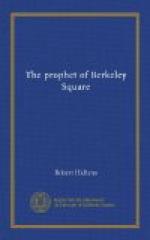Presently the uproar of the guitars grew more stentorian upon his ear, and, leaving on his left an astonishing chamber that contained from a dozen to fifteen small round tables, with nothing whatever upon them, the Prophet emerged into an inner hall where, in quite a grove of shrubs hung with fairy lights, twenty young ladies, dressed from top to toe in scarlet, and each wearing a large golden medal, were being as Spanish as if they had not been paid for it, while twelve more whacked castanets and shook bells with a frenzy that was worth an excellent salary, the silly gentleman from Tooting the while blowing furiously upon his flute, and combining this intemperate indulgence with an occasional assault upon a cottage piano that stood immediately before him, or a wave of the baton that asserted his right to the position of chef d’orchestre. Immediately beyond this shrine of music the Prophet perceived a Moorish nook containing a British buffet, and, in quite the most Moorish corner of this nook, seated upon a divan that would have been at home in Marakesh, he caught sight of Miss Minerva in company with a thin, fatigued and wispy lady in a very long vermilion gown, and an extremely small gentleman—apparently of the Hebrew persuasion—who was smartly dressed, wore white gloves and a buttonhole, and indulged in a great deal of florid gesticulation while talking with abnormal vivacity. Miss Minerva, who was playing quietly with a lemon ice, looked even more sensible than usual, the Prophet thought, in her simple white frock. She seemed to be quite at home and perfectly happy with her silly friends, but, as soon as she saw him hovering anxiously to the left of the guitars, she beckoned to him eagerly, and he hurried forward.
“Oh, Mr. Vivian, I’m so glad you’ve come! Let me introduce you to my great friend Eureka”—the lady in vermilion bowed absent-mindedly, and rolled her huge brown eyes wearily at the Prophet—“and to Mr. Briskin Moses.”
The little gentleman made a stage reverence and fluttered his small hands airily.
“Pretty sight, pretty sight!” he said in a quick and impudent voice. “All these little dears enjoying themselves so innocently. Mother Bridgeman’s chickens, I call them. But it’s impossible to count them, even after they’re hatched. Cheese it!”
The final imperative was flung demurely at a mighty footman, who just then tried to impound Mr. Moses’s not quite finished brandy-and-soda.
“Sir?” said the mighty footman.
“Cheese it!” cried Mr. Moses, making a gesture of tragic repugnance in the direction of the footman.
The mighty footman cheesed it with dignity, and afterwards, in the servants’ hall, spoke very bitterly of Israel.
The Prophet was extremely anxious to get a word alone with Miss Minerva. Indeed, it was really important that he should warn her of Sir Tiglath’s approach, but he could find no opportunity of doing so, for Mr. Moses, who was not afflicted with diffidence, rapidly continued, in a slightly affected and tripping cockney voice,—




